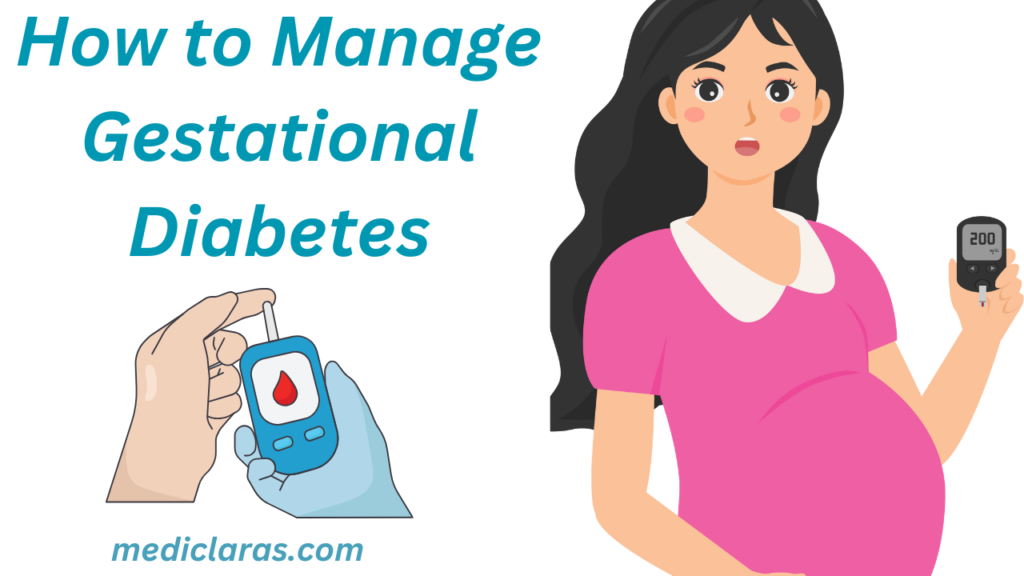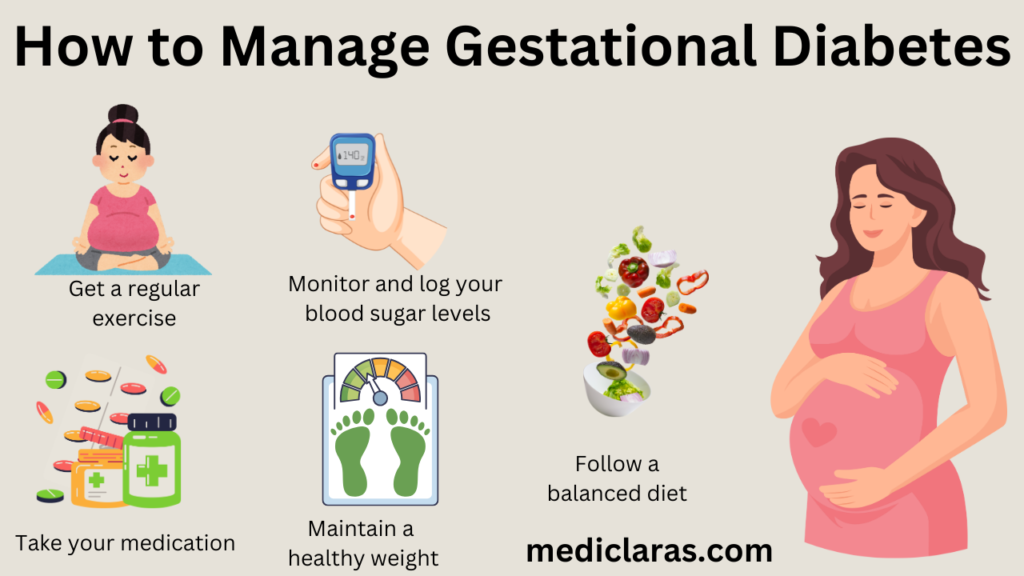A comprehensive guide to How to manage Gestational Diabetes:
High blood sugar levels are a symptom of gestational diabetes, a disorder that affects pregnant women . Although it can be worrisome, appropriate care grantees safe pregnancy and lowers the chance of difficulties for both the mother and the unborn child. We should understand the ways how to manage gestational diabetes.
What is gestational diabetes?
When blood sugar level is elevated in pregnancy, diabetes occurs named Gestational diabetes. It occurs when the placenta hormones prevent you from producing or using insulin .Insulin assists your body in regulating blood glucose level .
Pregnancy issues may result from having too much glucose in your blood. Between weeks 24 and 28 of pregnancy is when gestational diabetes typically manifests. To screen for gestational diabetes your prenatal care practitioner will prescribe a blood test .
Medical professionals control gestational diabetes with minor changes in dietary habits and lifestyle adjustments. Most mothers with gestational diabetes deliver healthy babies without major issues. Mothers should be educated about ways how to manage gestational diabetes.

What is the cause of gestational diabetes ?
Changes in hormone levels during pregnancy and how the mother body uses food as a fuel are the major causes of gestational diabetes.
The glucose in food is broken down and sent to yourself by a hormone called insulin. Your blood glucose level is maintained at a healthy level by insulin. But diabetes develops when blood sugar levels rise due to either insufficient or malfunctioning insulin.
The placenta hormones can affect how insulin functions throughout pregnancy. Gestational diabetes may result from its failure to properly control your blood sugar levels.
For whom is gestational diabetes at risk?
Gestational diabetes during pregnancy can affect anyone. However, certain risk factors may raise your threat. such risk factors include:
● Heart condition
● Elevated blood pressure
● Being overweight or a obese before becoming pregnant
● Individual with GD history
● Type 2 diabetes in the family
● PCOS or polycystic ovarian syndrome
● Old maternal age
Which signs show the presence of gestational diabetes?
Gestational diabetes typically shows no overt symptoms. Mild symptoms may go undiagnosed unless your healthcare provider performs a gestational diabetes test.
If symptoms are present they could include:
● Frequent urination
● Excessive thirst
● Fatigue
How does gestational diabetes affect newborn?
Your child is more vulnerable if you have gestational diabetes because:
● Elevated weight at birth
● Breathing issues from birth
● Low blood sugar. Newborn may have seizures as a result.
● Being overweight
● Early birth
● Diabetes type 2 in later age

How to manage the gestational diabetes?
You will require more frequent examinations during your pregnancy if you have gestational diabetes. Your healthcare practitioner throughout pregnancy will aim to:
Track the fetus development. Usually this entails a couple further ultrasound to ensure the fetus is not growing too big.
Examine the ranges of blood sugar. This usually entails talking about how frequently your blood sugar is high or low as well as examining broad patterns in your blood sugar levels.
Monitoring Blood Sugar levels:
Monitoring your blood sugar level aids in managing gestational diabetes. Your position good advice measuring sugar levels:
Fasting
After meals, one to two hours
Prior to going to bed
By monitoring these figures you can make necessary diary and treatment plan adjustments.
Follow balanced diet:
Eating whole some foods that don’t raised for blood sugar to dangerous levels will help manage can gestational diabetes. Make an effort to:
Stay away from sugary drinks and processed foods. Eat more frequently and in smaller portions. Plan to eat at the same time everyday. For every meal select a nutritious ratio of following: Carbohydrates such as whole grains ,oats and brown rice. Proteins like fish, poultry, tofu ,eggs and lentils. Include healthy fats like avocados ,seeds, nuts and olive oil. Foods high in fiber include fruits, vegetables and legumes.
Stay Hydrated:
During pregnancy it is critical to stay hydrated, particularly if you have gestational diabetes. However no research has shown that drinking water by itself will lower blood sugar levels.
However maintaining proper hydration does assist your body in controlling blood sugar levels. It aids in blood delusion which facilitates the kidney removal of surplus sugar. Additionally water can improve how well your body uses insulin which helps control blood sugar.
Engage in safe exercises: Your blood sugar may drop as a result of exercise which increases your body utilization of glucose. Consult your doctor about developing a healthy workout regimen if you have gestational diabetes.
Get prenatal checkups frequently Regular examination aid in tracking the development of fetus as well as your own health. In addition to checking for any possible issues you are doctor will evaluate your blood sugar levels and if necessary modify your treatmenat plan.
What are untreated gestational diabetes complications?
Both mother and the fetus may have difficulties if you are unable to maintain blood sugar levels within a healthy range. Diabetes during pregnancy may raise the risk of :
C section in the event that the fetus grows too large.
High blood pressure
Type 2 diabetes is somewhat more common in people with gestational diabetes.



